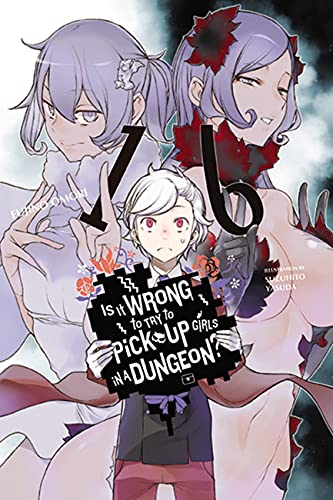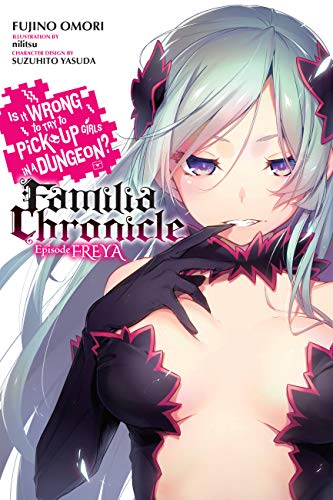By Fujino Omori and Suzuhito Yasuda. Released in Japan as “Dungeon ni Deai o Motomeru no wa Machigatte Iru Darou ka?” by GA Bunko. Released in North America by Yen On. Translated by Dale DeLucia.
Look, I know the spoiler. You know the spoiler. Most readers following this series have long since figured out the spoiler, if only as they googled the name and were redirected in a spoilery way. But yeah, this review is gonna talk about Syr, so if you say to yourself “oh, the shy but also sly waitress who likes Bell!”, I’d advise not reading this till you’ve read the book. We’ve seen Syr in action in one of the spinoff books, where she and Lyu go to a casino and she absolutely destroys a group of gamblers. But we’ve never quite seen Syr like this. This is Syr’s Last Stand. In the last volume we had a festival of remembrance, and in this one, hot on its heels, we have a festival of harvest. It’s meant to be a happy, joyous occasion, and is very popular with couples. As such, when Syr asks Bell out on a date, all hell breaks loose.
Admittedly it’s hard to pretend you’re avoiding a spoiler when the cover also heavily references the spoiler. So yeah, Syr is Freya. We all had guessed this by now, especially if we knew any mythology, and the derivation of the name Syr. That said, there’s another twist to it (hinted at in the Freya spinoff that came out last year) that makes things more interesting. For a good 3/4 of this book, however, this is really a cute romcom – something the author admits they were going for. Syr is, for obvious reasons, protected by the Freya Familia, and if she’s going to be dating Bell Cranel, then by God, she will be dating the BEST Bell Cranel, leading to a hilarious 5-day training from hell trying to teach Bell how to be a sexy boyfriend. (Poor Cassandra.) At the same time, Hestia is flipping out, and she and Aiz team up to follow Bell… as do Lyu and the rest of Syr’s co-workers. There’s funny moments, there’s sweet moments, there’s touching moments.
…and then it all goes to hell. Another slight spoiler, but the end of this book absolutely sets the table for the next arc, which I suspect is going to be “Freya Familia tries to kill all of Hestia Familia over and over again”. It has nothing to do with Bell figuring out Syr is Freya – he doesn’t. It’s simply that Syr left all her emotions and love on the table, begged Bell to accept her, and he CAN’T. He loves Aiz. (This is not stated explicitly with her name, but, um, see the previous 15 books). And it’s devastating and tragic until the last five pages or so, when you realize that oh shit, no, it’s going to be “fuck it, burn it all down” for Freya as she decides to have Bell Cranel By Any Means Necessary. It’s a stunning ending, and made me appreciate the comedy in this book all the more – I doubt we’ll see it in 17.
As with the wait between 15 and 16, 17 is not yet on Yen On’s schedule. Still, I hear 17 isn’t the end of the story arc either, so if you want to wait to binge, I’d advise against it. This works well as a stand-alone showing us what happens when someone who can get anyone she wants falls hard for the boy who won’t sleep with her because it would be wrong.


